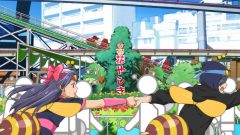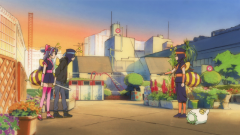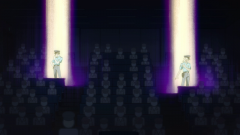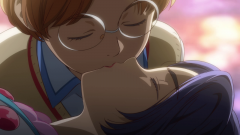And the wild ride is here. In turn for cardboard zombies last week, our three kappa-who-are-pooped-out-by-someone-else have to fight cat zombies, an acid bee-themed amusement park, a person with a cat face who clearly reference Buffalo Bill in The Silence of the Lamb, weeds and a (yuri) kiss at the end of the rainbow. It’s too much of Ikuhara’s quirks for sure. Does the whole episode make sense? Well, yes and no for me. There are still many unexplained threads, and sometimes it feels as if Sarazanmai is bizzare for the sake of weirdness, but there’s certainly charming and fun. First, It might not be clear what exactly are these cops, and what their true motives, but we do learn in this episode that they are in fact the ones who create the zombies. There is not enough information to classify them as villains, however. While it’s clear that they’re manipulative, for now I consider their action as trying to pull out something, whatever that something might be. Desire? Possibly since they shout “desire extraction” right there, but for what purpose? Nevertheless their theatrical performance inside the police station reminds me a lot of his previous works, especially when one pulls the heart out of the other, literally. Striking? Yes. Self-indulgent? Yes, as well. For this bit alone Ikuhara just repeats himself right there.
As with all Ikuhara’s features, well except maybe Yuri Kuma Arashi, there’s a big play on repetition here. At least, the formula pans out the same as with first episode. Kappa Zombies will appear in the sky in some bizzare forms (let’s take a random guess on what could appear next, I’d say, cucumber?), these three characters turn into kappa and do their musical sequence to get the shirikodama out of their butts. So what is the catch? Well, please welcome “the Dishes of Hope”, which can grant anyone’s wish. In fact, the main conflict of this episode lies not in the fight between them and zombie, but within the cast themselves. It’s where things get a bit more complicated, but more relatable. Kazuki wants the dish so that he can support his brother, Haruka, whom he has been crossdressing as an idol Sara Azuma for. It’s clear after two episodes that he would go for such length to protect his brother’s smile, but I still believe there are more than meet the eyes here. Whereas Toi has another sibling issue as well. His brother is a gangster and is apparently in some kind of debt, and within these two episodes we can see that Toi is playing with fire. He carjacks, he sells weeds and he has a gun (and doesn’t hesitate to use it). This sets off the first real character conflict and so far it’s nicely done.
That leaves Enta as the least complex character out of these three… until the revealing of the post-credit. Well, objectively he’s still the least determined to get the Dish for himself, but damn Ikuhara doesn’t beat around the bush this time. He’s in love with Kazuki and I’m curious to see how this angle is going to play out. Visually, Sarazanmai is IMPRESSIVE, especially in the sequence where Toi and Kazuki pretend to be a couple to catch the weed-eating cat in the amusement park. The layers, and the level of details are so detailed and a feast to the eye that this single screenshot (the top left) becomes my favorite single shot of this year so far (thanks Wooper for sharing the shot to me). Ikuhara himself said that Sarazanmai is about “connection”, and if you’re familiar with his works he isn’t subtle, nor straightforward about his themes. The characters will repeat that phase multiple times in an episode, there are tons of symbolisms will be thrown around our faces (case in point: the cops’ musical routine of touching pulling out one’s heart). But, let’s me ask my the earlier questions again? Does Sarazanmai make sense? Yes (thematically) and no (narratively). Does it really matter? Not one bit. Sarazanmai remains one of the most refreshing visual medium (not only anime) that I’ve encountered in recent years.




